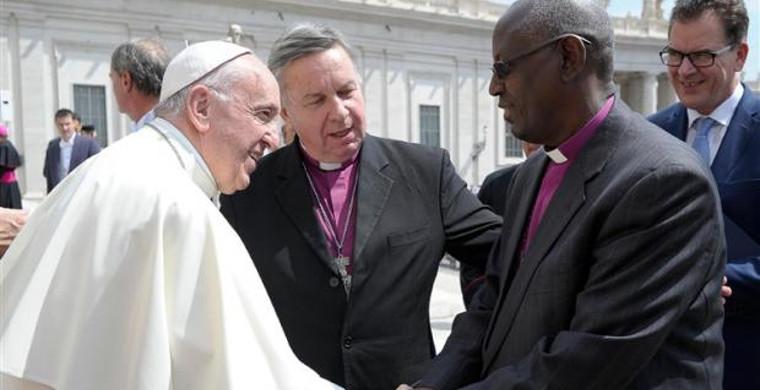Archbishop Ntahoturi takes up post in Rome
Vatican Radio
June 2, 2017
See, Archbishop Bernard Ntahoturi of Burundi, says his appointment will help Anglicans and Catholics to work more closely together on key issues of reconciliation, poverty and human trafficking.
The Archbishop, who will also serve as director of Rome's Anglican Centre, says his experience in jail, following a military coup in Burundi, taught him humility and other valuable lessons about the responsibility of religious leaders.
Ntahoturi served as chief of staff to Burundi's former President Jean-Baptiste Bagaza from 1979 to 1986. Following the overthrow of the government in 1987, he spent almost four years in prison.
After being consecrated bishop of the Diocese of Matana, and later serving as leader of the Anglican Church of Burundi for over a decade, Ntahoturi has played a key role in local and regional peace building efforts. He's also well-known on the international scene for his ecumenical work, serving on the central committee of the World Council of Churches.
Over the past 10 days, Archbishop Bernard has been in Rome, meeting Pope Francis and top Vatican officials ahead of the start of his new job in the autumn. Philippa Hitchen caught up with him to find out more about his past experiences and how they may help him in the challenges that lie ahead...
Archbishop Bernard pays tribute to the work of his predecessor, New Zealand Archbishop David Moxon and says he was grateful to meet with Pope Francis -- unexpectedly -- during the Wednesday general audience. He says he found the Holy Father "very well informed" about his appointment, adding that he looks forward to their next meeting in October when he can "explain my mission and get his blessing".
The major mission of the Anglican Centre, he says, is the work of "rapprochement" or bringing together Roman Catholics and Anglicans who together count close to one and half billion followers. "That's a population that can make a difference in the world," he says, adding that the main objective is "to witness to a divided world" in response to Jesus' prayer "that they may be one, so that the world may believe."
His appointment as the first African director of the Anglican Centre is a recognition that the Churches in Africa are growing, as well as sending a strong signal that the Church is universal. Secondly, he says, it sends a message that "we'll be concentrating and focusing on some of the problems and challenges we have in Africa," especially reconciliation, conflict resolution, poverty and human trafficking, where Catholics and Anglicans can come together to denounce these evils of this century."
Discussing his previous work in peace and reconciliation, Archbishop Bernard notes his role as chair of the council of all African provinces, as well as his responsibilities as vice chair of Burundi's commission on truth and reconciliation. Reconciliation is a word that all people of faith have to take seriously, he says, as "it talks to the hearts of people." Our responsibility, he says, is to "bring people together to see the other not as an evil, a demon, because there's demonisation, but as someone created by God."
The Anglican leader says his previous experience in Burundi doesn't compromise his role, but instead contributes to a greater understanding of human behaviour. Speaking of his time in the cabinet of former president Bagaza, he says those surrounding the military leader advised him that "conflict does not have a purpose" but he adds that Bagaza had his own personal convictions and "struggle for power." He says those years taught him "you can't ignore the role [...] and the presence of the Church, especially in Africa where people are deeply religious," a lesson which will help "in the work I'm doing here"
His time in jail, following the coup in his country, "taught me humility" and that "one should be prepared for changes", he says.
Asked about the desire of Pope Francis and Archbishop Justin Welby to visit South Sudan together, he says if the two religious leaders can travel there together, it "would be of great contribution to the process of peace". But he adds they "should really do that visit when inclusive negotiations have been started."
Commenting on diverging opinions within the Anglican world, Archbishop Bernard says "what Jesus Christ prayed for was unity in the Church, not uniformity". As we mark this year's 500th anniversary of the Reformation, he says, we are not celebrating divisions but rather remembering what happened, and we "should be aware of dividing" the Church of Christ today. Just as the first century Christians dealt with their differences through discussions, so "we should learn from what the early Church did," he concludes, not dividing the Church but continuing to "walk together".
END














